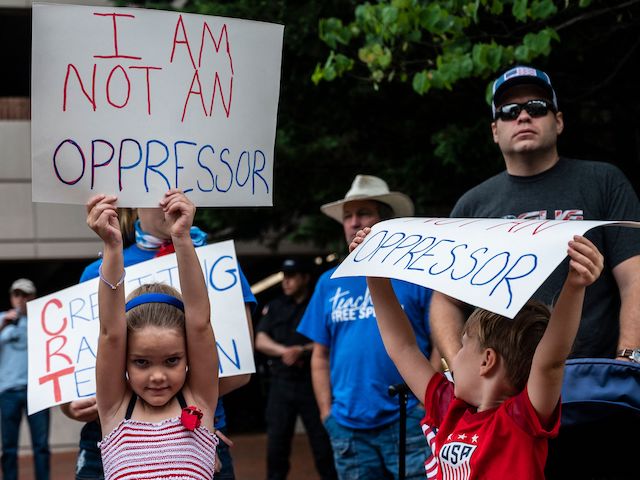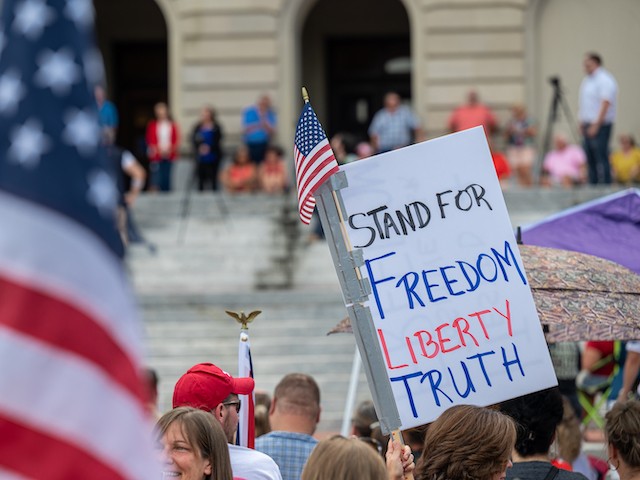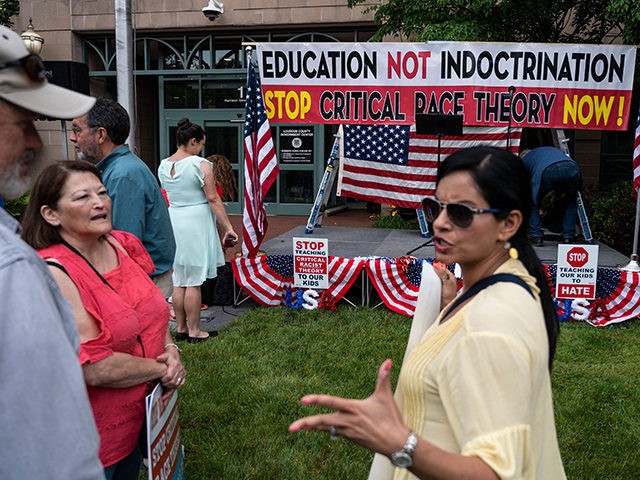The establishment media and left-wing activists insist that Critical Race Theory is not being taught in public schools. Evidence to the contrary, however, say otherwise. Four population books on applying the poisonous ideology to the education of America’s youth are publicly available on Amazon.
Critical Race Theory (CRT) is an academic movement transpiring at schools across the country, teaching children that the United States is fundamentally racist, and they must view every social interaction and person in terms of race in order to be “antiracist.”

People hold up signs during a rally against “critical race theory” (CRT) being taught in schools at the Loudoun County Government center in Leesburg, Virginia on June 12, 2021. – (Photo by ANDREW CABALLERO-REYNOLDS/AFP via Getty Images)

FRANKFORT, KY – AUGUST 28: People display signs during the Kentucky Freedom Rally at the capitol building on August 28, 2021 in Frankfort, Kentucky. (Photo by Jon Cherry/Getty Images)
This past year, concerned parents, teachers, students, and other citizens have slammed the “racist” curriculum, which does appear to be very unpopular among many of whom are aware of the material. Meanwhile, the establishment media has reacted by repeating the claim that CRT is not being taught in public schools.
Following Virginia Governor-elect Glenn Youngkin’s election win earlier this week, CNN reporter Eva McKend repeated the claim that Critical Race Theory is not being taught in Virginia schools. During his campaign, Youngkin shared his opposition to CRT.
“I do think that it’s worth noting, though, that in the last several weeks, this issue of Critical Race Theory, even though it is not being taught in Virginia public schools, it became so core in this race,” McKend said.
“And Youngkin mentioned it in every stump speech. It was his loudest applause line, that he was going to ban it, even though it was not being taught in Virginia public schools,” the CNN reporter added.
Despite McKend’s claim, however, several mentions of “Critical Race Theory” can be found on the Virginia Department of Education’s website, as well as on a presentation that appears to have been sponsored by the Virginia Department of Education in 2015.
A 2019 memo sent by a superintendent — found on the Virginia Department of Education’s website — recommends the books White Fragility by Robin DiAngelo, along with a second book that is the first of four popular books specifically on the topic of applying CRT to education.
Foundations of Critical Race Theory in Education
The book’s description, which is included in the memo, states that “the emergence of Critical Race Theory (CRT) marked an important point in the history of racial politics in the legal academy and the broader conversation about race and racism in the United States.”
The description also touts the book as a “groundbreaking anthology” that “provides an overview of the history and tenets of CRT in education,” and “seeks to explicate ideological contestation of race in education and to create new, alternative accounts.”
The publication “documents the progress to date of the CRT movement and acts to further spur developments in education policy, critical pedagogy, and social justice, making it a crucial resource for students and educators alike,” the description affirms.
Several books have been published on the subject of Critical Race Theory, specifically geared toward educators, to train them on how to implement CRT in the classroom.
Critical Race Theory in Teacher Education: Informing Classroom Culture and Practice
The book by Keonghee Tao Han and Judson Laughter, promotes the “widespread application” of CRT “to better prepare K–12 teachers.”
It also “explores the tradition and longevity of CRT in teacher education,” and “looks beyond CRT to other epistemologies often dismissed in White conceptions of teacher preparation,” according to its description.
The description adds that this publication also highlights “lessons to be learned for teacher educators who want to prepare teachers to be agents of social change.”
Critical Race Theory in Education: All God’s Children Got a Song
The book by Adrienne D. Dixson, Celia K. Rousseau Anderson, and Jamel K. Donnor describes itself as “a valuable guide” that “evaluates the role of CRT in the field of higher education,” and answers “important questions about how we should understand and account for racial disparities in our school systems.”
The book also traces “the roots of CRT from the legal scholarship in which it originated to the educational discourse in which it now resides,” and “examines contemporary issues in racial discourse and offers all-important practical methods for adopting CRT in the classroom.”
Critical Race Theory in Mathematics Education
A fourth book on CRT in education by Julius Davis and Christopher C. Jett explains how scholars can “expand the uses of CRT in mathematics education.”
Critical Race Theory proponent Ibram X. Kendi’s ideas have also been embraced by teachers’ unions. Over the summer, the American Federation of Teachers (AFT) featured Kendi during its TEACH (Together Educating America’s Children) professional development conference.
Education officials in Loudoun County, Virginia — which houses Loudoun County Public Schools, known by many as the epicenter of CRT-related controversy, among other types of altercations — have also acknowledged that CRT influences their work, according to an email obtained by Fox News.
Loudoun County Public Schools Superintendent Scott Ziegler has denied that the school district is teaching CRT to its students, and has instead claimed it has implemented racial “equity” education, adding that he understands why some parents may be confused, as he admits the equity training shares certain keywords with CRT.
“All of us in this work [of equity and diversity] are using this common vocabulary because it defines this work,” Ziegler said, adding that the overlap is unavoidable.
Given that the backlash to CRT has been so immense over this past year, it could be that education officials, educators, and the establishment media may start rebranding CRT by referring to it as something else, and using other types of keywords, such as “equity.”
You can follow Alana Mastrangelo on Facebook and Twitter at @ARmastrangelo, and on Instagram.

COMMENTS
Please let us know if you're having issues with commenting.